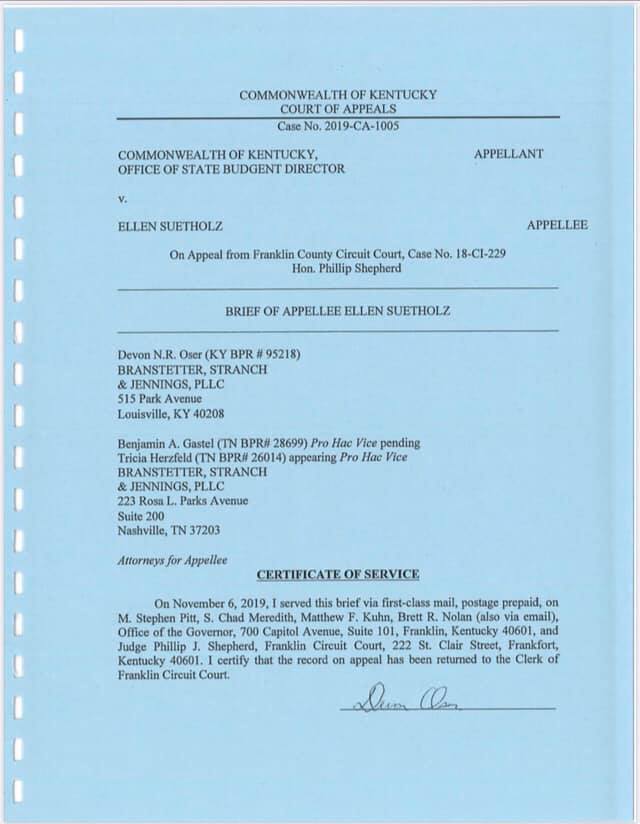
As voters went to the polls on November 5, attorneys for Ellen Suetholz were finalizing their brief to the Kentucky Court of Appeals in an open records case that began just under two years earlier when Suetholz requested a copy of the actuarial analysis commissioned by the Kentucky Retirement Systems of the Governor's "Keeping the Promise" pension reform plan.
https://www.facebook.com/419650175248377/posts/539733869906673?d=n&sfns…
KRS properly performed its statutory duty to obtain the analysis, and Suetholz properly exercised her statutory right to request a copy of the analysis. Only the State Budget Director's actions with regard to the analysis were legally unjustified.
He was unjustified in asserting custodial control over a KRS record, mandated by law and created at taxpayer expense, that provided critical insight into Governor Bevin's plan and the likelihood it would or would not achieve the desired goal of pension relief.
He was unjustified in denying the public access to that record.
He was unjustified in invoking the much abused preliminary documents exceptions to the Open Records Act and in advancing a strained construction of the exceptions which, as Suetholz' attorneys emphasize, "invites [the] Court to conclude that no 'final agency action' could ever take place that would compel the disclosure of the [actuarial] analysis."
Finally, he was unjustified in continuing to resist disclosure of the actuarial analysis in the face of cogent legal analyses by the Kentucky Attorney General and the Franklin Circuit Court, rejecting his argument that the actuarial analysis of a pension reform plan, the details of which have been painstakingly laid out to the public in a press conferences and legislative committee meetings, is preliminary because the legislature took no action on it and because it was watermarked "draft."
The Budget Director's likely rationale? To avoid embarrassment to the Governor by delaying release of a record — at least until after the election — that revealed that his "Keeping the Promise" plan did not deliver on the promise.
And so on November 6 Suetholz' attorneys filed their brief, carefully dissecting the twice repudiated arguments attorneys for the Budget Director laid out in their October 7 brief.
Suetholz' attorneys argued:
1) The actuarial analysis was not a tentative version or preliminary draft; nor was it submitted as an aid to developing a plan. It scored the final plan, that had been released to the public and on which public testimony had been offered, after the plan was finalized.
2) The actuarial analysis was not a preliminary memorandum in which opinions were expressed or policies formulated. It was an objective assessment of the plan that was devoid of opinion or recommendation.
3) "Final action" occurred when the Governor released the plan to the public and was not contingent on subsequent legislative action.
4) The watermark "DRAFT" which appeared on the actuarial analysis had no legal bearing on its status as an open record and is inconsistent with its content and purpose. Any other position would invite rampant agency abuse of the mandatory disclosure requirements in the Open Records Act.
5) Suetholz should recover attorneys' fees as the prevailing party because the circuit court properly concluded that the actuarial analysis was willfully withheld under the standard established by the courts and notwithstanding the fact that her attorneys represented her pro bono.
The latter issue is presented to the court as one of "first impression." It is, in fact, the only issue that warrants judicial consideration, all others having been more than adequately addressed in past attorney general's open records decisions, circuit court opinions, and caselaw.
Suetholz' attorneys counter the Budget Director's argument that they are not entitled to recover their fees. His position, they maintain, is demonstrative of his contempt for the Act and his apparent belief that exercise of rights granted by the Act should be reserved to those economically advantaged members of the public who can afford to pay attorneys' fees up front or over time for years of legal services expended in advancing the public's right to know.
It is an interpretation that has been rejected by the federal courts and that is contrary to public policy. It is an interpretation that, if adopted, would "have a devastating chilling effect" on the use of Kentucky's Act by ordinary citizens.
To date, no known Kentucky court has adopted the Budget Director's position. Not surprisingly, he cites no legal authority in support.
There is only one statement in Suetholz' brief that I sincerely hope is wrong. Her attorneys state that, two years after she requested the actuarial analysis from the Budget Director, we "are no closer to knowing what the analysis has to say about the Governor's proposal."
I believe we moved one step closer to knowing what the analysis says when the new Governor was elected one day before the brief was filed.
Once in office, Governor-elect Andy Beshear has the authority to settle Suetholz's case, ensure that her attorneys receive payment for the value of the legal services they provided, and, at long last, release the actuarial analysis.


